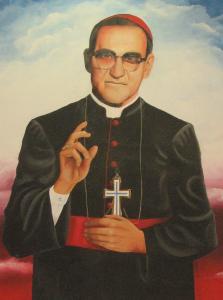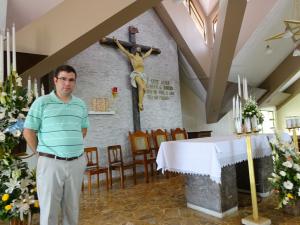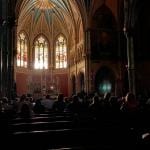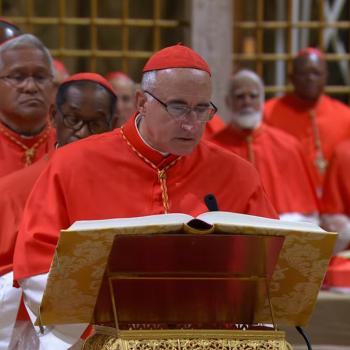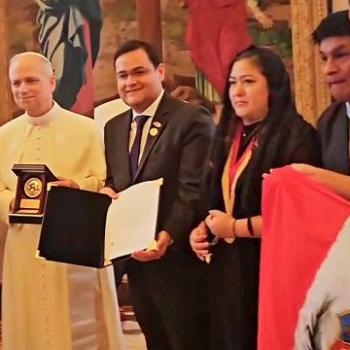“Jesus is radical,” stated Pope Francis during the canonization Mass of Pope Paul VI and Archbishop Oscar Romero three years ago. “He gives all and he asks all: he gives a love that is total and asks for an undivided heart… Jesus is not content with a percentage of love: we cannot love him twenty or fifty or sixty percent. It is either all or nothing.”
The Gospel of the rich man who went away sad after Jesus asked him to sell all his possessions provided an appropriate reflection for the canonization Mass of Saint Oscar Romero. “Archbishop Romero left the security of the world, even his own safety, in order to give his life according to the Gospel, close to the poor and to his people, with a heart drawn to Jesus and his brothers and sisters.”
Six years ago I had the honor to attend his beatification in San Salvador with about 500,000 others. Many in El Salvador considered that day a confirmation of what the people there already knew: Romero died as a martyr for preaching love and justice during a time of great injustice. He is now officially counted among the Saints of God.
In 1977, San Salvador welcomed a new archbishop, Oscar Arnulfo Romero. Three years later, the archbishop was killed by a single bullet shot from the backseat of a car parked outside the chapel where he was celebrating Mass. Romero, having received countless death threats, no longer allowed concelebrating priests or altar servers to accompany him in the sanctuary. He did not want the bullet meant for him to kill someone else accidentally.
During the times of Oscar Romero, Catholics gathering for a Bible study were considered subversive since the catechists were teaching peasants how to read and write. Any criticism of the ruling party earned one a death sentence. In its attempt to fight communist guerrillas that were present in El Salvador, the government killed over 70,000 innocent civilians including hundreds of priests, sisters (including four American church women, three of them nuns) and thousands of catechists. The murder by right-wing government forces of Romero’s good friend Father Rutilio Grande marked an awakening in Archbishop Romero. The government’s unwillingness to investigate the murder caused Romero to speak against the injustices committed by the country’s rulers. His desire to uphold the equality of all before God regardless of social status was not appreciated by the powerful.
The day before he was martyred for hatred of the faith, Archbishop Romero made an emotional plea to the men of the army, National Guard, police and military. During his Sunday homily at the cathedral he said, “you are killing your own brother peasants when any human order to kill must be subordinate to the law of God which says, ‘thou shalt not kill.’ No soldier is obliged to obey an order contrary to the law of God…. It is time you… obeyed your consciences rather than a sinful order. The Church, the defender of the rights of God, of the law of God, of human dignity, of the person, cannot remain silent before such an abomination. In the name of God, in the name of this suffering people whose cries rise to heaven more loudly each day, I implore you, I beg you, I order you in the name of God: stop the repression.” The reaction was applause.
With these words Romero had crossed a line. For the government, he was calling for insubordination. For him, he was proclaiming the Gospel. In the same way Jesus Christ did not intend to enter politics but was executed with the political charge of “king of the Jews,” Archbishop Romero, who did not intend to enter politics, was accused of politicking while he was simply proclaiming the Gospel.
Romero’s enemies accused him of ascribing to liberation theology, yet the liberation Romero preached is the freedom enjoyed by the children of God, “a liberation that has, above all else, respect for the dignity of the person, hope for humanity’s common good, and the transcendence that looks before all to God and only from God derives its hope and its strength” [from the beatification homily].
Archbishop Romero certainly died a martyr and now we acclaim him among the Saints in God’s presence. He was killed by those did not want to be challenged by the Gospel and preferred to silence him. They may have silenced him, but his prophetic voice has persevered and Saint Romero, in the words of Saint John Paul II, now “belongs to the Church.”
Me standing at the altar where the new saint was killed while celebrating Mass
Picture I took of the solar halo that appeared right after the beatification proclamation was read
Pictures are mine, except top one of Romero which is free to use.


